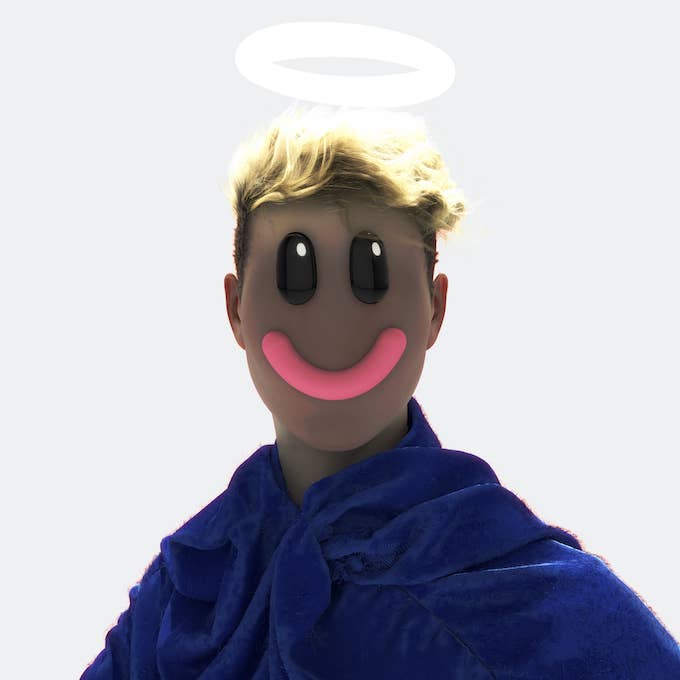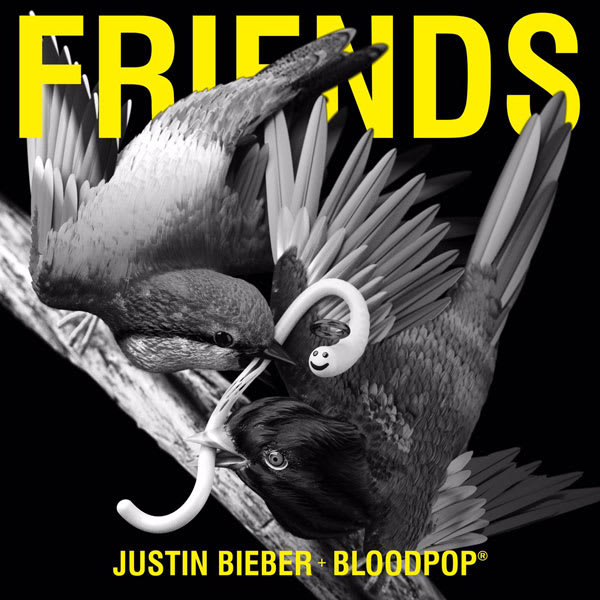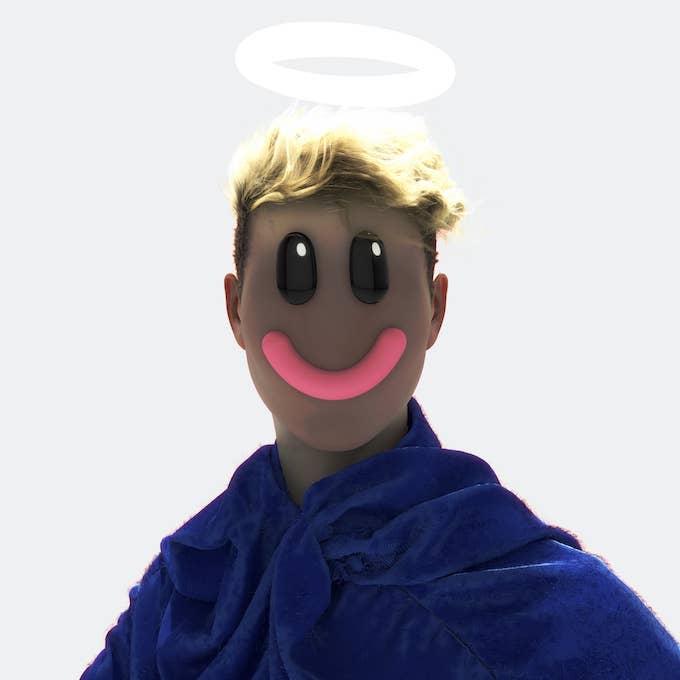
Justin Bieber released a new song recently. “Friends” is typical post-maturation Bieber: charming, catchy, more sophisticated than the pop star is generally given credit for, but still reliably to-the-point. It’s also successful, hitting #20 on the Billboard Hot 100—low on Bieber’s long list of hits, but an undeniable achievement for a driving, Robyn-esque loosie—and currently sitting on upwards of 136 million streams on Spotify to date. “Friends” is atypical for Justin Bieber, though, in one big way: he’s sharing the spotlight, in this case with an enigmatic producer named BloodPop®.
BloodPop® is waiting in the wings for now, but the Bieber collaboration is the first step in the producer’s bid for the spotlight. Like Calvin Harris and DJ Khaled, he’s working on a star-studded compilation-style album, and he got one of the biggest pop stars on the planet for his first single. It makes sense, BloodPop® was behind (in part) Justin Bieber’s “Sorry”—the song that truly heralded the arrival of his second act—one of the singer’s biggest hits to date. Next up for the collaboration album is going to be songs with Fetty Wap, Ellie Goulding, and Julia Michaels.
But, that’s only part of the story. BloodPop® first got his start his start as Blood Diamonds in the Canadian DIY scene alongside Grimes. Since then, he's moved to Los Angeles and kickstarted a pop production and songwriting career, working with artists like Charli XCX, Madonna, and, of course, Bieber.
Complex caught up with the producer to find out how one goes from SoundCloud and working with Das Racist to an in-demand pop writer, his reasons for (slowly) stepping out of the spotlight, and how you get your name on a Bieber song.
I wanted to start off by asking how you got here? You started out as a DIY producer, and I was just wondering what the path was from there to being co-billed on a Justin Bieber single.
It was just kind of a series of incidences that I didn't really seek out, that just happened. I was living in a hotel in Vancouver and I saw that I had a credit on a Charli XCX album, on Atlantic, and I just had no idea how any of that worked. She sang over one of my songs from SoundCloud. I think that was technically my first production credit, outside of doing my own stuff. And I had not met Charli at the time, and the same thing happened with this group Das Racist, they had also rapped over one of the songs that was on my SoundCloud. I think that was the first proper release, first and last proper release, that album.
Those two songs specifically, I didn't really seek out to produce for other artists. It was just kind of people on the internet, reaching out. I kept living in this hotel, I'm very gracious to the owner of that hotel, because he kind of let me DJ in the basement, and sometimes work the door for rent, in a way. So I lived in this hotel, kind of club, for like a year and a half in Vancouver.
What was it called?
It was called the Waldorf. It was kind of like a tiki-themed bar? It was great. The owner, he had a studio in the basement and it was just a weird, awesome place. Some nights I would work the door, with a blazer, and then I'd go DJ, and then I'd go kick someone out. I was just, like, a guy. What was great about that place, too, was when artists were in town, a lot of artists would either do after parties there, or just drop by cause for a second it was the only place that wasn't a franchised club in Vancouver. It's shut down now, the whole thing.
I was living there and then one day, my parents in Kansas City just got a cheque in the mail and they're like, "we think you got a cheque in the mail, can we open it?" I said, "Yeah, of course, cause I'm living off Subway." And randomly, the Das Racist song got put in a Kmart commercial? Like, a holiday Kmart commercial. I was just like, "What the fuck.” I had never even worked with these guys, and now it's in a commercial. That afforded me to move.
Wow.
Yeah. It got rid of any outstanding debt I had, gave me enough to find a place in L.A. with a roommate, get gear, do the damn thing. So weirdly, I guess it traces back to Das Racist.
And Kmart.
And Kmart! I got a proper computer situation and proper software and just the bare minimums, but it was a big deal at the time. Then I was just plopped in LA and I remember, I got here on a Super Bowl Sunday, I think, and I went to Sonny’s—Skrillex—place around the Super bowl and I didn't know anyone that well, I just met a ton of people and I just started sessioning. I don't know, it was just kind of a thing you do in L.A. and was super awkward at first. I was just told that's what you do. I did that for quite a while and I was doing sessions out of my bedroom.
What do you mean by sessions?
It's like blocks of time set aside for writing music. I did that for about a year or so in my bedroom, even the first time I properly worked with Charli she had come to that house and we worked. We still talk about it because it was so bad, I had no idea what I was doing. I just didn't have the work ethic or the focus to host a session, which was probably why I was not getting any music done.
Eventually I worked with a producer, who is one of my favorite producers, DJ Dahi, and we hit it off. I learned so much from DJ Dahi, he had such intense focus and work ethic, and just one of the nicest people I have ever met. He just really inspired me to get focused and finish it. We started making a ton of beats and then a few months later he was like, "want to come to New York to work on Madonna?" and I was like, "Um, yeah, absolutely."
What was supposed to be a one week session turned into a, I feel like what was two months? Two months, with one week home back in LA. It was a lot of fun and a lot of learning experience. I feel like that was the threshold of me being like "OK, pop production is what I want to be doing." And that kind of led into everything else, from that era to now. Once you do a few things that aren’t—with the Madonna records, even though they aren't, like, smashing records, people will still call you up just because you worked. You know what I’m saying? It feels like an unspoken code of, “That producer's fine, whatever, he can come to the studio now.”
Is it hard to fail out once you've made it that far?
Fail out?
Yeah, from there you have a career trajectory and you’ll get work no matter what?
Yeah, it just depends, because it’s a double-edged blade. When I was under my old moniker and just doing music by myself, the only person I had to make happy was myself. And when I put out a record I wouldn't be like, "OK let's see how many streams it's getting, let's look at the data,” all those stresses. Pop music is called pop music because it has the notion of being successful—which is why it's called "pop"—it’s a lot of stress and expectations. The main difference to what I was doing then to what I'm doing now, is there’s expectations of expectations.
You’re working with huge names now.
Yeah, big artists and many collaborators, and everyone wants it to be a success, because most pop records are a team effort. Working on Madonna, I didn't want to let DJ Dahi down, that's one thing I was really thinking about. It does change the trajectory and took a second to really get used to thinking about.
What makes you good at this kind of collaborative songwriting? What makes you able to walk into one of these rooms and make a pop record?
It's one of those things that's hard to say, "I'm good at that." Because sometimes I’m not [Laughs].
Sure, but in terms of you saying that when you started out you were bad at it and today you’ve clearly made a name for yourself, what was the learning process?
In terms of skill, the biggest curve is trying to think more about the artist you're working with. Their perspective, and what’s going on in their life. Having the empathy, that was really tough, because I never had a ton of friends, or anyone to sharpen those skills off of? Luckily, a lot of the artists I have worked with have just been very, very open about their life and what they want to achieve. A lot of times, the success of a record is how much of that artist is willing to let the collaborators in. That took a lot of time to learn because I feel like the earlier sessions, when I was first starting out, went so badly because I was just thinking about fucking Ableton. I was thinking about, “Oh, this sound should sound like this.” I wasn't thinking emotionally.
You mentioned earlier your name change, can you run me through going from Blood Diamonds to BloodPop®, with the registered trademark symbol at the end?
When I started Blood Diamonds, I had zero intentions of being anything other than a game designer, that's what I what was focusing on when I was making the early Blood Diamonds stuff. I moved to Canada to be a game designer and I never even thought people would listen to the music, or anyone would give half a shit about it. As time went on I became uncomfortable with insensitivity of the notion of Blood Diamonds. I had started Blood Diamonds when I was, like, 18, that's when I chose that moniker. As you mature, you learn. There was a lot of pressure to keep it, and it came to a point where I was like, "Nah, I'm not having this." There's even a small phase where I was just going by Michael Diamond. Not many people know about that. I feel like such an extremely different person now than when I was Blood Diamonds. It feels like really different people.
In what way?
I don’t know, it was so long ago. The places I was living, the places I was making things, just feel so distant and foreign now. Name aside, even sonically, it feels so distant.
Then I chose BloodPop® after “Sorry” came out, because it was kind of a hard commitment to pop music. And I just want to be totally front-facing about pop music, and not being afraid of pop and just presenting this as "pop is the craft." There's been a lot of super successful pop artists in recent years who are like, "This is my art album", and you're like, "Wait, wasn't that like your album with all the iconic songs on it, wasn't that your art album?"
What does pop mean to you? If you had to try and define it.
Pop to me, is speaking to as many people as possible. One of the reasons why I wanted to focus on pop is, when I was making just tracks for myself and tracks for SoundCloud, doing nothing about anybody else kind of thing, for me and my situation, I felt so selfish. Here I am, holed up in a hotel, just making music for me all day. And even though, under any circumstances, I don't think pop music can save the world or dramatically change situations, but I do think it's a great vehicle for positivity. My real end game is just taking the human condition and putting a positive spin on it, then broadcasting it to as many people as possible. That was the goal with, "Friends," and that was the goal with "Sorry." They’re two very positive songs.
Last question about the name, the addition of the trademark symbol at the end there. What was the thinking behind that?
That's a little tongue and cheek, just about commercialism of pop. It's just so upfront you know what you're getting, like it's a brand. I feel like most big artists, they might as well have a registered trademark.
Have you registeredBloodPop®as a trademark?
Yep, it's still pending. But hopefully it goes through. Otherwise, I might have to take it off.
One last question about your come up as a producer, where does Grimes fit into all of this? Your collaborations with Grimes were the first things I heard from you.
My first show, ever, in Vancouver, I met Grimes. I opened for her and that was just a Vancouver promoter booking that. We put out a couple successful songs, she invited me to play in her band, and that's how I met Sonny, and then I ended up doing a publishing thing with Sonny which kind of changed the trajectory to writing. I'm sure you know the other records we did later on...
Well, “Phone Sex” is still one of my favorites of both of yours.
Oh, wow. That's an old one, I was just looking at the date on that, so crazy how long ago that was.
For the Bieber collaborations, so you worked on "Sorry" and did you work on any other tracks from that album? Or was it mainly that track.
Yeah I did "Sorry," "I'll Show You," "Mark My Words," "Children," and "Hit the Ground."
Was that just a thing where you got brought in as a writer? How did you guys get hooked up.
I was invited to the first session by Sonny, and I worked with a writer called Pooh Bear. "Mark My Words" was written the first night, and then it became the first track on the album. Then, a week after, "Sorry" was written with Julia Michaels and Justin Tranter. Then a few weeks later, they were just like, “This is going be one of them,” and two weeks after that it was out. It was so so fast. It all happened within the span of less than two to three months.
Now you’re co-billed on a song with him? How does something like “Friends” happen? What's the decision making process for you to not be the producer or writer, but be the collaborator?
"Friends" was a demo I had started with Julia and Justin—the same team behind "Sorry.” Since "Sorry" they have become some of my best friends, I love them to death. Justin had heard the demo of "Friends" and he loved it, and he finished it, cut it. Then all of a sudden Bieber is on it and the whole song done.
As the demo form, I was going to just put it out as BloodPop® as a part of a record that I had been working on for the last year, year and a couple months, which is all songs with featured artists. Again, that came together very quickly. The art hadn't even been done before he heard it. The birds and the worm.
I was also going to ask about the smiley-face motif. I’d missed that the worm was smiling, the first time I saw it.
He’s having a great time. It points back to my goals of positivity in pop music. It's two birds fighting over this, like, gummy worm. And the gummy worm is just chilling, “It's going to be fine, and I'm having a great time.” And the hook is, "Can we be friends?”

When Justin Bieber decides to hop on a song that you plan to be yours, is there ever a conversation where someone asks if it could, or should, be just a Justin Bieber song?
Yeah, that will always happen. I think historically and even right now, every production song that's out right now with features, or as a collaboration with another artist, the artist definitely just asks if, you know, it can just be one artist. I feel like that is just how it goes for every collaboration.
Do you just ask Justin Bieber's team, or the label and say "Hey, I want this to be mine as well?"
Well, yeah. Without getting into the business of it—all those things are just so overly complicated, I stay as far away as I can and try to make it sound good. I try to keep my head out of the business end.
What’s it like working with Justin Bieber, do you work in the studio together or is does he just hear these reference tracks and they pick what they want to jump on and you hear the finished version?
It's kind of a mixed bag, he writes sometimes. Sometimes he cuts it fast, sometimes he'll cut it in a month. A lot of the Purpose stuff, he was in the room. And then this, I had missed some, because I was in Japan while he was here.
What's he like in the studio?
He gets right to business, and he knows exactly how to approach a singing style for whatever the vibe of the song is. He'll just knock it out of the park. Especially on Purpose, it's weird because you'll hear a demo or something, and then he sings it, then you're like, "Oh, wow, that's a hit." He can really fucking sing.
I hear Bieber likes to rap a lot, and I've heard a couple songs where he's rapping. Is that something you've ever heard him do while working together?
There was one night where I think he rapped, like, 100 bars over a beat. Just totally freestyled. It was great, it was a good night. The beat never ended up getting used, but it's somewhere, I think it’s like a 20-minute song.
So you're not working on a project with Justin Bieber, this is a part of a collaborative album you're working on with other artists?
Right.
Can you talk about who else you're working with?
It's kind of on the wraps, there are songs I've hinted at and probably aren’t a surprise. The next song is with Julia Michaels, I'm really excited about that. There's another song with Ellie Goulding and Mr Eazi. It's very feature-heavy.
What made you want to do this kind of project and move out from being a person who makes pop songs behind the scenes and make your name front and center?
It was getting to a point where, the songs I had released for other artists is probably 2% I've done, or co-written, or produced. At a certain point where you have so many songs, that you know are good songs, but the label or the artist doesn't know it. They’ll ask you to make it, like, tropical house. You just think like, "fuck, just let me do my thing, man." I’ve had labels ask me, "Can you make this sound like Kygo?" and I'm just like, "No!" And then they don't want to work with me anymore.
Part of it is like, believing in certain sounds and certain vibes and putting them out there so that those types of people can feel it and be like, "can you make something like ‘Friends?’" or whatever else is on the radio. So it's a little bit of that, a little bit of knowing what I want.

